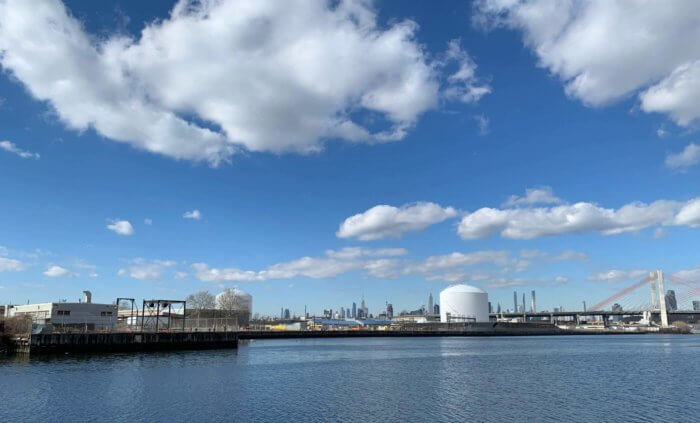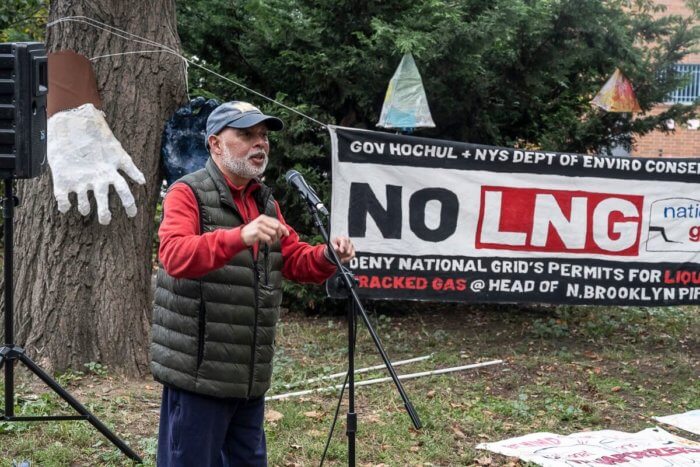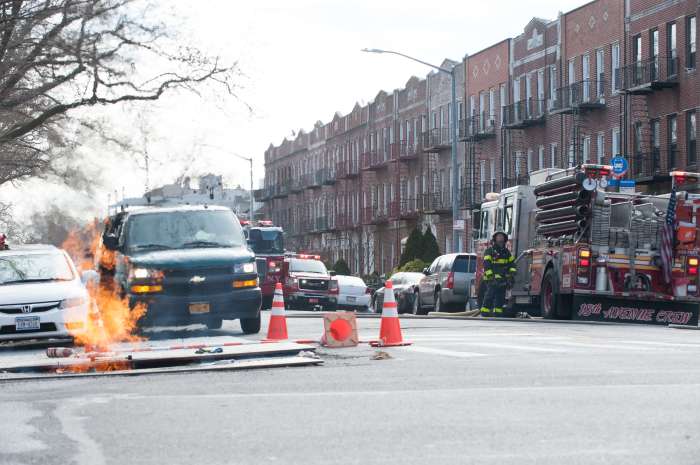The state’s Department of Environmental Conservation has decided to suspend their decision on issuing air pollution permits for new gas infrastructure at National Grid’s Greenpoint Energy Center until another state agency decides whether or not the project is truly needed.
“The timeframe for the New York State Department of Environmental Conservation to take action on the permit application for the proposed Greenpoint Energy Center project has been suspended, subject to National Grid commencing and resolving a public proceeding before the New York State Public Service Commission to evaluate whether the proposed project is demonstrably needed for reliability purposes,” a department spokesperson said.
In a May 6 letter to National Grid, DEC said the British oil company, who provide gas and electricity for millions of New Yorkers, plans to file a “cost recovery” petition with the state’s Public Service Commission in a bid to recoup the expense of building two new Liquified Natural Gas vaporizers at the Greenpoint Energy Center.
Once National Grid has filed the petition, they will need to prove that the vaporizers are “demonstrably needed” as part of the PSC’s analysis. To ensure DEC “has all the necessary facts and information to make an informed decision on the pending permit application,” the department has decided to delay their decision until after the PSC issues theirs.
Repeated delays at the Greenpoint Energy Center decision have frustrated the community
“We have agreed to a mutual extension to allow time to initiate PSC review of the Greenpoint Energy Center Vaporizer Project to confirm it is necessary for reliability, which we expect will take three to four months,” said National Grid representative Wendy Frigeria. “A decision on this project is critical to ensure we can serve our existing customers on the coldest winter days when they need us most for heating. Maintaining safe and reliable energy networks in New York is essential to achieving the goals of the CLCPA.”
National Grid will need to submit a “reliability needs assessment” to the PSC, according to a spokesperson, which will be followed by “extensive opportunity for public review and comment.”
“The PSC’s review will be thoroughly conducted,” the representative said.
The assessment has not been submitted as of May 9. DEC’s letter, dated May 6, was sent just a day before DEC was set to issue their decision on the Air State Permits, which would allow the company to move forward with constructing the two new vaporizers. The department has pushed their deadline back several times since National Grid first applied for the permits in 2020.

The repeated delays have frustrated some community groups and neighbors, who say the project is in violation of the state’s climate goals and puts neighbors who live near the energy center at risk.
“Once again, justice has been delayed. Governor Hochul and the DEC could have protected families living next to National Grid’s Greenpoint liquified fracked gas storage facility but instead chose to keep them at risk,” said the No North Brooklyn Pipeline Coalition, in a statement. “The evidence is clear: National Grid’s vaporizers violate the [Climate Leadership and Protection Act] and should be permanently rejected.”
The CLCPA, touted as one of the country’s most aggressive climate plans, seeks to cut statewide greenhouse gas emissions by 40 percent by 2030, and by at least 85 percent by 2050. Last month, National Grid released its “Clean Energy Vision,” which would, in part, replace fossil fuels with renewable natural gas and green hydrogen.
According to National Grid, the two new vaporizers, which take stored liquified natural gas and return it to its gaseous form and vent it into the system during peak demand, are more efficient than the existing vaporizers on the site and would reduce emissions associated with the vaporizers as a result.
Since the vaporizers are only needed on the coldest days of the year, they have been used infrequently in recent years — firing up for between two and 14 days each winter.
Rate case requires special review by third-party consultant
In a rate case decided last year, the PSC allowed National Grid to increase charges for about 1.2 million customers in Brooklyn, Queens, and Staten Island to recover costs of some of the utility’s projects, but ruled that special review would be required if the company wanted to recoup the costs of certain “long-term capacity” projects, including the vaporizers.
During that review, an independent consultant appointed by the state’s Department of Public Service will decide whether National Grid’s assessment of demand for gas is “reasonable” and if the new vaporizers are needed to meet that demand, analyze potential greenhouse gas emissions associated with the project, and accept comments from the public.

If the consultant deems the project unnecessary, National Grid will not be able to recoup costs — but would be allowed to raise the idea again in future rate cases. The PSC’s decision would not stop the utility from constructing the new vaporizers — or any other long-term projects — but prevents them from recovering the cost of construction through the 2021 rate case. As of October, the company had spent $27 million on the project.
Earlier this year, the company filed a cost-recovery petition for a different long-term project in Suffolk County, Long Island. While the PSC has yet to issue a formal decision, PA Consulting, the DPS-appointed independent analyst, largely agreed that the project was necessary. In 2021, National Grid received a “ReliabilityOne” award from PA Consulting.
In a National Grid report from December 2021, the utility said there was a significant risk of not receiving the DEC permits in a timely manner or at all — and said the company could have difficulty meeting demand for gas in the winter of 2023-24 if they did not receive the permits in the spring of 2022.
What comes after the PSC’s decision
DEC will issue their decision on the permits within 30 days of the PSC issuing theirs, according to the letter. The department has previously asked National Grid to expand on the need for the new vaporizers given the city’s soon-to-be-enacted ban on new gas hookups and confirm the need for the project to meet demand — especially if it is found to violate CLCPA guidelines.
Activists hoped that the department’s decision in October to deny permits to two fossil fuel projects in Newburgh and Astoria on the grounds that they were not necessary enough to merit violating the CLCPA meant a swift halt to National Grid’s plans was in the works. Last week, the No North Brooklyn Pipeline coalition delivered a 13,000 signatures on a petition calling for Gov. Kathy Hochul and the DEC to deny the permits to the governor.
It’s not clear how or if the PSC’s decision will impact the DEC’s decision.
“It’s the same thing again and again,” said Elisha Fye, Vice President of the Cooper Park Houses Resident Council. The public housing development sits across the street from the Maspeth Avenue depot where the vaporizers would be built, and many residents worry about the health impacts of living so close to the plant.
“My community will not be able to heal or rest until we know that National Grid stops expanding their poison for good,” Fye said.























